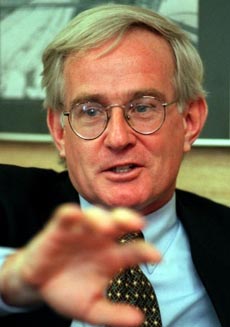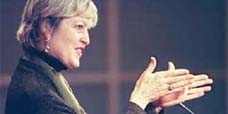
In April 2001, Mr. Murphy attended a meeting at Larry's Roadhouse with his campaign manager David Caliguiri, Arlington neighborhood activist Michele Balcer and Pittsburgh Fire Fighters Local 1 President Joseph King. On April 30, Mr. King wrote to union members that he'd reached agreement with the city on contract basics that would preserve jobs and raise wages between 4 percent and 8 percent. Mr. King later estimated that the raises would have cost the city $10 million to $12 million over four years, had the deal not been trimmed after 2002. At around the same time, the 870-member union switched its endorsement from then City Council President Bob O'Connor to Mr. Murphy. Thomas Murphy, Jr., former Mayor of the City of Pittsburgh, PA , served as a Peace Corps Volunteer in Paraguay in the 1970's.
Feds agree not to prosecute in return for Tom. Murphy's acknowledgement that he traded a generous contract for the support of the firefighters union
Former Mayor Tom Murphy heads into the record books (with an *)
A strange deal with the feds was the latest twist in a career that began with activism, ended with aloofness
Tuesday, July 04, 2006
An analysis by Dennis B. Roddy, Pittsburgh Post-Gazette
In a city renowned for political horse-trading, Tom Murphy preferred to travel by foot: walking door-to-door, retailing himself as a leader beyond politics, a youthful voice of reform in a town he said was slowly dying from doing things the old way.
Now, with a two-year federal probe ending in a strange agreement not to prosecute in return for Mr. Murphy's acknowledgement that he traded a generous contract for the support of the firefighters union, a self-made reform politician goes into the record books with an asterisk.
This was a former seminarian and Peace Corps volunteer who in 1975 got chucked into the back of a police wagon when, he says, he stopped to help a group of youths who were being beaten by police.
In 1989, Mr. Murphy, then a state legislator from the North Side, came in a surprising second in the Democratic mayoral primary to incumbent Sophie Masloff, beating three others, including the favored county Controller Frank Lucchino.
Elected mayor four years later, he succeeded in building two stadiums and a new convention center. But in the course of those successes, the often aloof Mr. Murphy alienated old friends and newfound allies, finally losing both his political edge and his reformer's label.
"The dark side of the force is strong. I don't know how much it was Tom or how much it was the system that pushes people," said Mark Fatla, who entered Mr. Murphy's orbit during his days at the Community Technical Assistance Center, part of the stew of community groups with whom Mr. Murphy built his early base.
Mr. Fatla recalled Election Night 1993, when the room was filled with community activists drawn to the campaign.
"By the first re-election campaign, those persons were not active or their participation had been reduced," Mr. Fatla said. The first signs of problems were budget cuts for community groups, he said. Later, it was access.
"I think as he became enmeshed in the bigger issues in the mayor's office, it got harder and harder to talk to him, but it got much harder to hold his attention. And when you did talk to him you got the sense that his mind was already made up, that he wasn't open any longer to what you were telling him. I think that was the change," Mr. Fatla said.
To many who saw the transformation, Mr. Murphy's disaster was caused by his straying from his political base and embracing another -- the more traditional city politics with which he never felt comfortable and whose practitioners never quite accepted him.
Mr. Murphy and his chief lieutenant, Executive Secretary Tom Cox, cut their teeth as North Side community developers. In the idealistic atmosphere of the early 1970s, he should have fit in -- but didn't.
"Tommy was not a reformer. Tommy was a loner. There's a big difference," said Bob Cohen, a Shadyside consultant who preceded Murphy as director of the North Side Civic Development Council.
Tom Murphy was first elected a state representative in 1978. Mr. Cohen, who now advises clients in Harrisburg and Pittsburgh, views Mr. Murphy's management style as both his strength and weakness. Appointed to the chairmanship of the Insurance Committee in the state House, Mr. Murphy disappointed party leaders by refusing to raise campaign funds from lobbyists who did business with the committee, a long-standing Harrisburg practice Mr. Murphy found repugnant. Caucus politics did not interest him.
"Tommy was the world's worst politician," said Mr. Cohen.
In 14 years as a state representative, Mr. Murphy strengthened his reputation as a neighborhood builder, but never became a coalition builder.
Instead of making the Harrisburg tavern circuit, where lobbyists and legislators share drinks and ambitious legislators map out deals, Mr. Murphy's work in the house was literal. He spent his evenings rehabbing a rundown house he co-purchased with four other members for $4,000 at 1616 Green St. in Harrisburg.
"He would stay back and work on that house. He wanted the neighborhood to look better," said Allen Kukovich, one of the residents at 1616 Green.
Mike Dawida, another legislator who entered the House the same year as Mr. Murphy, and with whom he aligned himself politically, recalled his colleague as an idealist capable of spotting important policy issues, but not adept at working the legislative levers to bring them about.
"He wasn't always good at working with the Legislature. Others would have to take up the ideas," Mr. Dawida said.
Mr. Murphy's biggest weakness, Mr. Dawida said, was a failure to listen.
"Reformers tend to be people who listen. He didn't cultivate that talent very well," Mr. Dawida said. "It got a lot worse in the mayor's office."
Dan Cohen, who served on City Council during Mr. Murphy's tenure as mayor, remembers a man who rarely initiated contacts on his own.
"There was an aloofness," said Mr. Cohen, who now works as a telecommunications lawyer. "Was Tom a politician? Not as we typically use the term. He was the anti-politician."
That anti-politician posture would sometimes frustrate Mr. Murphy's supporters. His staff would sometimes be frustrated that, during fund-raisers, the mayor didn't seem to know who his biggest donors were.
For that matter, he didn't always know when his fund-raising events were scheduled, said Sal Sirabella, deputy mayor under Mr. Murphy.
On one occasion, Mr. Sirabella recalls Mr. Murphy returning from a run and saying, " 'You know what? I think we have a fund-raiser tomorrow. Isn't it great that we don't even know when our fund-raisers are?' "
Some Democratic ward leaders gradually became disenchanted. "The only time he knew my name was when he was up for re-election," said Barbara Ernsberger, who has chaired Shadyside's 7th Ward Democratic Committee since 1994 and who was elected city Democratic chair during Mr. Murphy's administration.
She recalls putting in a phone call to the mayor's office to suggest a meeting between Mr. Murphy and the Democratic committee.
"I was told we were not on his agenda," she said.
A partnership with Allegheny County Commissioners Mike Dawida and Bob Cranmer helped Mr. Murphy build two new stadiums and a convention center. That, too, frayed.
One notable moment came Sept. 29, 1998, when government buildings along Grant Street were evacuated when an unexplained noxious odor wafted through. City and county emergency officials didn't communicate with each other, even though they shared some of the same buildings. The ensuing turf battle between the city and county climaxed when Mr. Murphy announced he was calling off plans to merge the city's 911 center with Allegheny County's.
Mr. Dawida was stunned by the reaction.
"I guess what I'm saying is there were these issues that popped up from time to time when a little bit of listening would have done the guy some wonders," Mr. Dawida said.
Relations with City Council were strained, thanks to both fiscal constraints and Mr. Murphy's infrequent communication with council, said Dan Cohen.
Then came the publicly financed construction of two new stadiums despite taxpayer resistance, and the mayor's controversial effort to revitalize Downtown's Fifth and Forbes retail district.
Mr. Murphy wanted to seize properties and turn them over to a Chicago developer. "We asked for an open process, and in fact it was a closed process," said Arthur Ziegler, president of the Pittsburgh History & Landmarks Foundation. A Murphy enthusiast in 1994, Mr. Ziegler joined the many vocal critics of the Fifth and Forbes plan.
Mr. Dawida sees Fifth and Forbes as the turning point leading to Mr. Murphy's slide.
"He had invested a lot of his capital in it because the Downtown of Pittsburgh was always a kind of showplace," Mr. Dawida said. "It was the public perception that this was a very important thing and then it never happened."
When retailer Nordstrom pulled out, Mr. Murphy abandoned the plan. But with his neighborhood base disenchanted, and his foes energized, the mayor had to build a new base.
He reached out to firefighters.
In April 2001, Mr. Murphy attended a meeting at Larry's Roadhouse with his campaign manager David Caliguiri, Arlington neighborhood activist Michele Balcer and Pittsburgh Fire Fighters Local 1 President Joseph King.
On April 30, Mr. King wrote to union members that he'd reached agreement with the city on contract basics that would preserve jobs and raise wages between 4 percent and 8 percent. Mr. King later estimated that the raises would have cost the city $10 million to $12 million over four years, had the deal not been trimmed after 2002.
At around the same time, the 870-member union switched its endorsement from then City Council President Bob O'Connor to Mr. Murphy.
"I told Tom at the time I thought it was a bad deal. But he didn't often listen," Mr. Dawida said.
Mr. Sirabella doesn't think the fire union's endorsement decided the 2001 primary, which Murphy won by 699 votes.
Nonetheless, had 350 people -- firefighters or otherwise -- moved from Mr. Murphy's to Mr. O'Connor's column, the former wouldn't have had to contend with a budget meltdown and, presumably, last week's odd settlement that suggested Mr. Murphy had done something if not indictable, at least wrong.
To some old friends, it seems almost as if Mr. Murphy's lack of skill in the kinds of insider dealing he so flatly rejected starting with his Harrisburg days, might have left him unprepared for the junctures at which politics and governance sometimes merge.
"It would seem to me that there are some people who might be what's described as wheeler-dealers in political jargon, who might know how to handle those situations better, perhaps, than someone who's not used to figuring out how to deal with tough contracts when there's an election coming up," said Mr. Kukovich. "It takes someone with rare skill. For someone who's not adept at that sort of thing, I guess it can be a problem."
It remained for Mr. Dawida to sum up the paradox of his old friend: "He was bullheaded, stubborn and opinionated. But he wasn't ever dishonest. This kind of thing implies that he was and he wasn't."
(Staff writer Rich Lord contributed. Dennis Roddy can be reached at 412-263-1965 or droddy@post-gazette.com. )





















